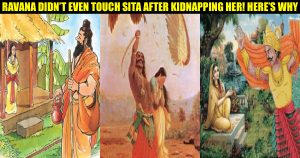
Why Didn’t Ravana Touch Sita Though He Kept Her With Him In Lanka For Many Months
Ramayana, the most admired manuscript of the story of Rama and Sita is well popular and considered as the sacred tale for Hindus. There are many characters, many turns, interlinks, and twists and whatnot, Ramayana is a story full of morals, ethics and epic personalities.
But, there are many questions which ordinary people often raise, behind the every move made by the person, there are sets of ideologies and reasons. Starting from the birth of Rama and Sita, every major incident in Ramayana has a deep meaning and effect from the earlier life (Reincarnation).
To study and to understand Ramayana, one has to go through many eccentric tales in Hindu mythology.
Out of many less known answers and theories, there must be a doubt on Ravana taking away Seetha when Rama was out of the home. Many people raised doubts claiming that Ravana held Sita with him for so many months in Lanka and why didn’t he touch Sita? Yes! he held her for too long and didn’t try to rape her.
After all, we know how powerful Sita is, she’s the reincarnation of Goddess Laxmi, and if she wills to free from the Lanka, she can do it by herself, but all she wanted is, to let her husband-Rama make that for her sake and honor her.
And there’s a bright reason behind Ravana not touching Sita, and here’s the most appropriate theory:
Earlier, before Sita entered his life, Ravana once camped near the city of Kubera, while he was coming back from his mission to sister Kumbinasi from the hands of the ogre Madhu. (Kumbinasi was the daughter of Kaikasi’s sister). Kaikasi was, as we may recall, the mother of Ravana. After completing his mission, Ravana was resting in the vicinity of Kubera’s city. With a cloudless sky, a lovely atmosphere and the love-laden songs sung by Kinnaras and Vidhyadharas, he easily fell a prey to his own lust at the moment.
And unfortunately, he was not accompanied by any of his favorites. It so happened by sheer accident that Rambha, the celestial nymph, passed by, though she was married to Nalakubara, son of Kubera and therefore in all fairness, the daughter-in-law of Ravana.
Ravana was unaware of this fact at first when he grabbed her to him. Rambha pleaded with him to restrain himself informing that she actually belongs to Nalakubara and the relationship between her and Ravana was far above carnal appeasement. According to the Valmiki Ramayana, Uttara Kanda, Canto XXVI, Sloka 29, Ravana has said:
“I can understand that if you are the wife of my son Indrajit. But you are the wife of my brother’s son! The plea which you have given in the words, ‘I am your daughter-in-law’ holds good in the case of those who have (only) one husband. Celestial nymphs have no husband nor are gods committed to a single wife such is the eternal law obtaining in the realm of gods.”
Ravana, in lust, violated her that day, though she kept pleading with him not to do so. She was not for this kind of an illicit relationship. Ravana appeased and satiated left her alone. She went to her husband Nalakubara with folded hands and tears welling up her eyes and narrated him the entire episode in vain.
Furious Nalakubara poured a little water in his palms and pronounced this curse on Ravana, sprinkling the water.
“Since O blessed lady, you stand violated by him perforce, unwilling as you were, he shall no longer be able to approach any other young woman who is unwilling to accept him. When (however) stricken with love, he will violate a woman who is unwilling to approach him, his head will actually be split into seven pieces that (very moment) (Sloka 55).”
Ravana was shaken for the first time in his entire lifetime. “Hearing of the aforesaid execration, which caused his hair to stand on end, Ravana, (the ten-headed monster) felt inclined no more to copulate with women who were unwilling to approach him” (Sloka 59).
Although, this curse by Nalakubara has given relief to all women, who were devoted to their husbands and had been brought by him, says Valmiki in his very version of Ramayana.